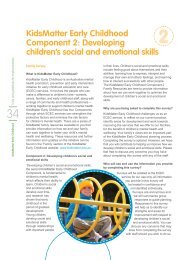About family relationships - KidsMatter
About family relationships - KidsMatter
About family relationships - KidsMatter
You also want an ePaper? Increase the reach of your titles
YUMPU automatically turns print PDFs into web optimized ePapers that Google loves.
3<br />
component<br />
<strong>About</strong> <strong>family</strong> <strong>relationships</strong><br />
Children thrive on feelings of belonging and affection that come from having caring<br />
and supportive families. Research affi rms that the quality of <strong>family</strong> <strong>relationships</strong> is more<br />
important for children’s wellbeing than the size or composition of the <strong>family</strong>. Whether<br />
families have one parent or two, whether they include step-parents, grandparents or<br />
other carers, they can build strong, positive <strong>family</strong> <strong>relationships</strong> that promote <strong>family</strong><br />
wellbeing and support children’s mental health.<br />
The keys to developing strong and caring <strong>family</strong> <strong>relationships</strong> include making<br />
<strong>relationships</strong> a priority, communicating effectively and providing support for each other.<br />
However, building and maintaining positive <strong>relationships</strong> with children and with all <strong>family</strong><br />
members is not always easy. Different needs arising within the <strong>family</strong> may create tensions<br />
between <strong>family</strong> members, and pressures that come from outside (eg work or fi nancial<br />
pressures) may also impact on families and children. Sometimes these pressures can<br />
make the development of positive <strong>family</strong> <strong>relationships</strong> more diffi cult. Yet, even taking<br />
these infl uences into account, there is much the adult or adults in the <strong>family</strong> can do to<br />
build strong <strong>family</strong> <strong>relationships</strong>.<br />
Families are different<br />
Families vary in the expectations they hold regarding<br />
children’s behaviour and the roles of parents and carers.<br />
This leads to differences in <strong>family</strong> <strong>relationships</strong> and<br />
communication styles. Many beliefs about what makes<br />
for strong <strong>family</strong> <strong>relationships</strong> are infl uenced by the<br />
values and experiences that parents and carers were<br />
exposed to in their own families while growing up.<br />
Cultural background can also impact on the values<br />
and goals adults have for children’s development.<br />
For example, it is common in Western industrialised<br />
societies like Australia for parents and carers to value<br />
children’s independence, whereas parents and carers<br />
from other cultural backgrounds sometimes give more<br />
emphasis to <strong>family</strong> responsibilities than to children’s<br />
independence. There are also many differences within<br />
cultures. Differences in the ways that families are made<br />
up lead to different relationship and support needs.
Meeting different kinds of<br />
relationship needs<br />
Two-parent families are built on the primary couple<br />
relationship and this continues to have a major infl uence<br />
on <strong>relationships</strong> amongst all <strong>family</strong> members. Parents<br />
can fi nd it a challenge to meet children’s needs as well<br />
as their own needs as partners, however, ensuring<br />
that some time is set aside to attend to the couple<br />
relationship is very important. When confl ict between<br />
parents is not resolved, it may impact directly on<br />
children and/or on parenting effectiveness. Maintaining<br />
effective communication and support for each other as<br />
parents enhances the couple relationship and supports<br />
positive <strong>relationships</strong> in the <strong>family</strong> as a whole.<br />
Sole parents are a diverse group. They may miss<br />
the support that having another parent or carer would<br />
provide and may feel over-stretched by the responsibility<br />
of caring for children alone. For sole parent families<br />
in particular, having a support network of friends<br />
and relatives makes a big difference. Separated sole<br />
parents and children also benefi t from having a positive<br />
co-parenting arrangement with the other parent. This<br />
can be achieved when parents and carers value and<br />
respect the importance of children having opportunities<br />
to develop their <strong>relationships</strong> with both parents.<br />
Blended and step-families can have more complex<br />
relationship needs to take into account. Children may<br />
feel their prior <strong>relationships</strong> with parents or carers<br />
are displaced by the new couple relationship. Family<br />
members, especially children, may still be grieving the<br />
loss of their original <strong>family</strong>. New <strong>relationships</strong> between<br />
children and parents or carers need to be negotiated<br />
and old ones renegotiated. Children may spend time<br />
with two families who have different expectations of<br />
them. These changes can cause signifi cant strain and<br />
stress to children as well as to parents and new partners.<br />
It is important to reassure children that they will still<br />
have the love and support of both parents. Taking things<br />
slowly helps by allowing time for everyone to adjust<br />
to new circumstances. Making realistic expectations<br />
and house rules clear to all step-<strong>family</strong> members is<br />
very important. For example, it is especially helpful for<br />
children and step-parents to recognise that they don’t<br />
have to love one another but they are expected to treat<br />
each other with respect.<br />
What supports strong<br />
<strong>family</strong> <strong>relationships</strong><br />
Two main dimensions of the parenting role have been<br />
found to have important effects on <strong>family</strong> <strong>relationships</strong><br />
and on children’s development, no matter what kind of<br />
<strong>family</strong> children are raised in. These are:<br />
1 Communicating warmth and care<br />
2 Establishing clear and appropriate limits for<br />
children’s behaviour<br />
Positive styles of communication are a common<br />
element that supports both of these dimensions.<br />
All families experience ups and downs as they strive to<br />
do their best for children and deal with challenges that<br />
come along. A recent study 1 asked Australian families<br />
of different kinds to nominate what they considered to<br />
be the characteristics that made their families strong in<br />
spite of any diffi culties they might face. This table shows<br />
the eight characteristics that were identifi ed.<br />
Family strengths as identified<br />
by Australian families<br />
Communication – listening to each other and<br />
communicating with openness and honesty.<br />
Togetherness – sharing similar values and beliefs<br />
that create a sense of belonging and bonding.<br />
Sharing activities – spending time together doing<br />
things they enjoy, for example, sports, reading, camping,<br />
playing games.<br />
Affection – showing affection and care on a regular<br />
basis through words, hugs, kisses and thoughtfulness.<br />
Support – offering and being able to ask for support,<br />
with <strong>family</strong> members knowing they will receive assistance,<br />
encouragement and reassurance from one another.<br />
Acceptance – understanding, respecting and appreciating<br />
each <strong>family</strong> member’s unique personal qualities.<br />
Commitment – seeing <strong>family</strong> wellbeing as a fi rst priority<br />
and acting accordingly with dedication and loyalty.<br />
Resilience – being able to withstand diffi culties and adapt<br />
to changing circumstances in positive ways.<br />
Families in this research also identifi ed that the biggest<br />
challenges in <strong>family</strong> <strong>relationships</strong> were communication<br />
breakdown, parenting issues and diffi cult relationship<br />
dynamics. Acknowledging existing <strong>family</strong> strengths is<br />
a good starting point for addressing challenges and<br />
building stronger <strong>family</strong> <strong>relationships</strong>.
Communication skills for<br />
building <strong>relationships</strong><br />
Good communication is essential for healthy<br />
<strong>relationships</strong>. The way people talk and listen to each<br />
other builds emotional ties and helps make expectations<br />
clear. Effective communication helps <strong>family</strong> members<br />
feel understood and supported. The adults in the <strong>family</strong><br />
in particular play a critical role in communicating to<br />
children values such as respect and caring. They do this<br />
by talking with children and especially by demonstrating<br />
their values in the way they communicate.<br />
Listening<br />
Listening attentively and actively is most important<br />
for creating a climate in which open and honest<br />
communication can take place. Focussing on what the<br />
other person is saying, rather than thinking of your own<br />
response while they are speaking, shows that you are<br />
genuinely interested. Listen for meaning and feeling and<br />
actively check that you understand the other person’s<br />
point of view, for example: “It sounds like you’re feeling<br />
sad because you wanted to have a turn like everyone<br />
else and you missed out.” To listen actively to children,<br />
give them your full attention while they are talking and<br />
help to draw out their feelings and understandings.<br />
Taking a little extra time to listen also helps you and<br />
your child come up with better solutions for problems<br />
(rather than imposing your own solutions).<br />
Tuning in<br />
Paying attention to emotional connections is really<br />
important for supporting positive <strong>family</strong> <strong>relationships</strong>.<br />
As well as listening to words, effective communication<br />
requires paying attention to body language and<br />
expressions so as to notice and respond to feelings.<br />
Tuning into your own feelings and expressing them<br />
in ways that allow others to understand how you feel<br />
promotes caring <strong>relationships</strong>. Tuning into children’s<br />
behaviours and the feelings they communicate is<br />
especially helpful for understanding children and guiding<br />
them as they learn to express their feelings in words.<br />
What you do (or do not do) also sends a message which<br />
is interpreted by <strong>family</strong> members. Clear messages are<br />
less likely to be misinterpreted. Avoid giving mixed<br />
messages in which you say one thing and do another.<br />
Since actions often speak louder than words, try to<br />
ensure that there is a match between what you do and<br />
what you say. When this is not possible (eg you are<br />
not available when you said you would be) be sure to<br />
provide an explanation and apology.<br />
Talking with children<br />
Parenting research has found that many parents or<br />
carers talk much more than they listen to children.<br />
While it is necessary for adults to communicate their<br />
expectations, children also need to be heard in order to<br />
feel connected and valued. The way that adults speak<br />
can encourage children to respond or to shut down.<br />
Listening well, paying attention to what children say and<br />
asking specifi c questions encourage children to talk<br />
more. Invite children to talk by giving them space. Often<br />
they fi nd it easier to talk when they can be spontaneous,<br />
for example, while you are doing an everyday activity<br />
with them, rather than sitting down to talk face-to-face.<br />
Problem-solving<br />
Addressing and solving problems supportively helps to<br />
strengthen <strong>family</strong> <strong>relationships</strong>. This involves:<br />
• identifying the problem that needs to be solved,<br />
rather than judging the person<br />
• making sure that everyone’s concerns are listened to<br />
• coming up with a range of options or alternatives and<br />
thinking them through together<br />
• choosing a solution or action plan that everyone<br />
involved can agree with<br />
• trying it out and checking how it goes.<br />
Using a <strong>family</strong> problem-solving approach helps to avoid<br />
blaming, demonstrates support for <strong>family</strong> members, and<br />
helps to build togetherness.<br />
It is also a very effective way of helping children learn<br />
skills for problem-solving and decision-making that they<br />
can use in many different situations.<br />
When families experience confl ict that is repeated or<br />
severe it is important to seek professional relationship<br />
counselling. Counselling can help to prevent problems<br />
worsening, so it is ideal to seek it early rather than<br />
waiting too long. Unresolved confl ict can lead to<br />
aggression, intimidation, or violence. These are<br />
completely unacceptable behaviours that have<br />
particularly destructive effects on both individuals<br />
and <strong>family</strong> <strong>relationships</strong>.
Dealing with conflict<br />
Confl ict is a normal (and healthy) part of <strong>family</strong> life.<br />
Families are made up of individuals who will sometimes<br />
have different, ideas, wants or needs. Since confl ict is<br />
inevitable, it is important for families to have effective<br />
ways of managing it. Remember that confl ict itself is not<br />
a problem – but the way it is handled might be. When<br />
confl ict is managed in positive ways, <strong>family</strong> <strong>relationships</strong><br />
are strengthened. When not dealt with effectively,<br />
confl ict can be stressful and damaging to <strong>relationships</strong>.<br />
Key points for building better<br />
<strong>family</strong> <strong>relationships</strong><br />
Emphasise positive communication<br />
Remember that good communication starts with<br />
effective listening. Encourage talking by listening<br />
actively to other <strong>family</strong> members to better understand<br />
their perspective.<br />
Make regular ‘quality time’ a priority<br />
Families benefi t from having time to unwind and relax<br />
with one another. Making sure you have un-pressured<br />
time to spend doing things you enjoy together makes<br />
for positive <strong>relationships</strong>.<br />
Offer support<br />
Appreciate more than criticise one another and be<br />
ready to offer help when needed.<br />
Many parents and carers fi nd that confl ict between<br />
siblings is a recurring concern. Children in the same<br />
<strong>family</strong> often argue, tease and complain about each<br />
other, even though at other times they may provide<br />
good company for one another. When children fi ght it is<br />
important for parents and carers not to take sides, but<br />
to help children identify the problem behind the confl ict<br />
and guide them through a process of peaceful confl ict<br />
resolution. Though children may look to a parent or<br />
carer to judge who is right and who is wrong in a confl ict,<br />
taking this approach can lead to more frequent confl icts.<br />
Assisting children to work through the steps of confl ict<br />
resolution helps them learn how to manage confl ict fairly<br />
and builds a basis for cooperation.<br />
See the <strong>KidsMatter</strong> Primary information sheets on<br />
problem-solving and decision-making, social and<br />
emotional learning, effective discipline, and<br />
resolving confl ict for ideas on building stronger<br />
<strong>family</strong> <strong>relationships</strong>.<br />
1<br />
Geggie, J., DeFrain, J., Hitchcock, S. & Silberberg, S. (2000).<br />
Family Strengths Research Project. Newcastle NSW:<br />
Family Action Centre, University of Newcastle.<br />
This resource is part of a range of <strong>KidsMatter</strong> Primary information sheets for families and school staff.<br />
View them all online at www.kidsmatter.edu.au<br />
Copyright: © Commonwealth of Australia 2012-13. This work is copyright. You may use this work in accordance with the terms of licence available at www.kidsmatter.edu.au


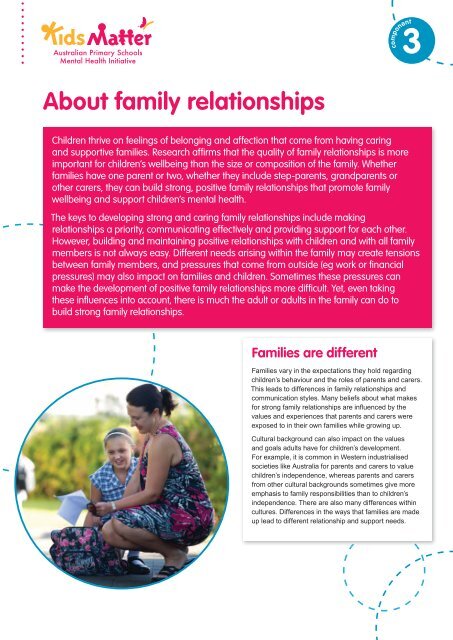
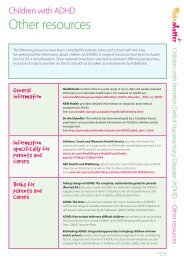
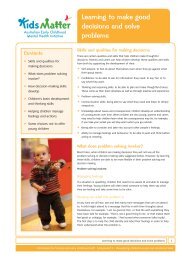
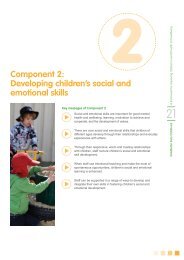
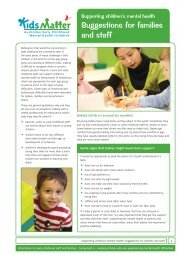
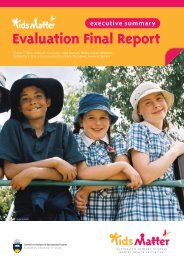
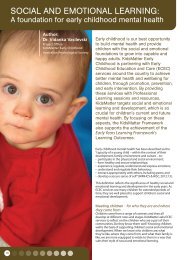
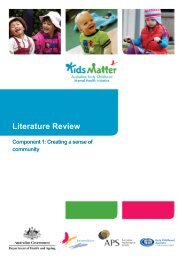
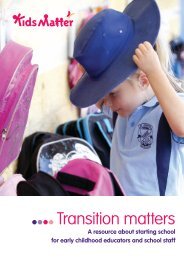
![Trinity Anglican School - Cairns story [378KB]pdf - KidsMatter](https://img.yumpu.com/41716076/1/184x260/trinity-anglican-school-cairns-story-378kbpdf-kidsmatter.jpg?quality=85)
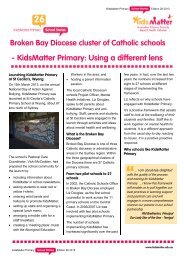
![Happy families work together [327KB] PDF - KidsMatter](https://img.yumpu.com/40767384/1/184x260/happy-families-work-together-327kb-pdf-kidsmatter.jpg?quality=85)
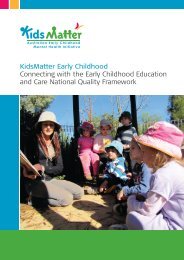
![Action Team Handbook 2012 [1.9M] [PDF] - KidsMatter](https://img.yumpu.com/38050920/1/184x260/action-team-handbook-2012-19m-pdf-kidsmatter.jpg?quality=85)
![[1008KB]pdf - KidsMatter](https://img.yumpu.com/38050895/1/184x260/1008kbpdf-kidsmatter.jpg?quality=85)
